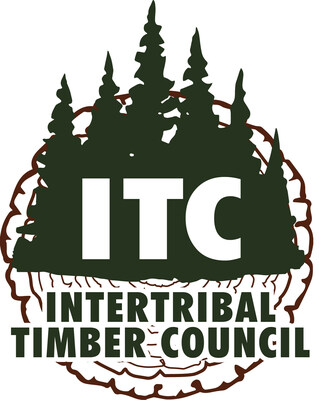Expanding Tribal Forest Management to Fight Wildfires Across Shared Boundaries with Federal Lands
Cody Desautel, ITC President, testifies before the House Committee on Natural Resources Federal Lands Subcommittee
WASHINGTON, Dec. 5, 2023 /PRNewswire/ -- Thousands of miles of shared boundaries with federal agencies compound the risk of wildfire on Indian lands. There are countless examples of wildfires spreading from federal lands onto tribal forests, causing significant economic and ecological losses. These fires regularly pose risks to human life on Indian lands and have resulted in fatalities.
"Tribes actively manage their forests for multiple uses, including economic revenue, jobs, traditional foods, and materials. Catastrophic wildfire can negatively impact all of these uses for multiple generations," said Cody Desautel, President of the Intertribal Timber Council.
Fortunately, Congress recognizes the need for tribes to work closely with federal neighbors to reduce fire threats. The Tribal Forest Protection Act (TFPA) allows tribes to petition the federal government to perform stewardship activities on their lands next to Indian lands. The 2018 Farm Bill expanded the TFPA and gave tribes the authority to enter into Good Neighbor Agreements (GNA) with federal agencies.
"The ITC works hard, in partnership with the Forest Service and the Bureau of Land Management, to ensure that both tribes and federal land managers are aware of these opportunities and implement them to improve forest health and wildfire resiliency. But much more needs to be done," Desautel said. The Indian Forest Management Assessment Team Report (IFMAT) found that Indian forests receive only a fraction of the funding provided to public and private forests.
"The continuing failure of the United States to meet its fiduciary responsibilities for stewardship of these renewable resources is placing tribal forests in jeopardy from catastrophic loss from wildfire, insects, and disease," Desautel said. IFMAT shows that many tribes are underfunded when managing their own land and cannot plan large projects on adjacent federal land.
The ITC also recommends that Congress ask federal judges to weigh the long-term impacts of inaction, like wildfires, versus the short-term impacts of forest management activities when ruling on contested forest management plans.
"The ITC would like to work with this committee and the Administration to find better ways of building tribal capacity to get work done on federal lands," Desautel said.
The Intertribal Timber Council is a nationwide nonprofit consortium of Indian Tribes, Alaska Native Corporations, and individuals dedicated to improving natural resource management in Native American communities.
SOURCE Intertribal Timber Council (ITC)
News published on and distributed by:




